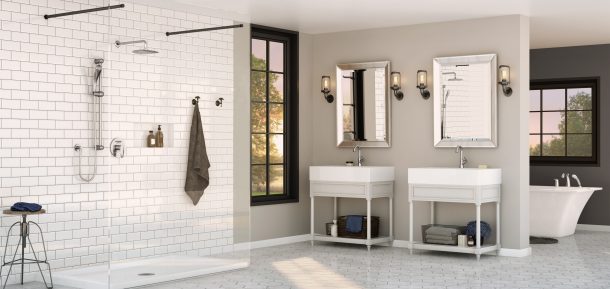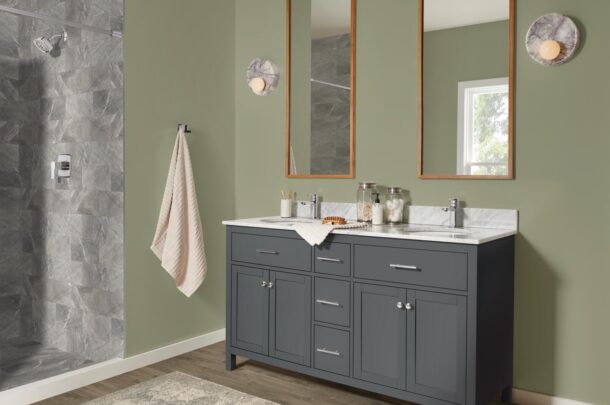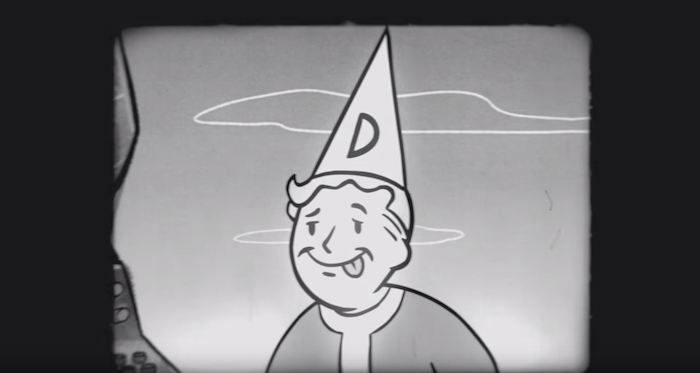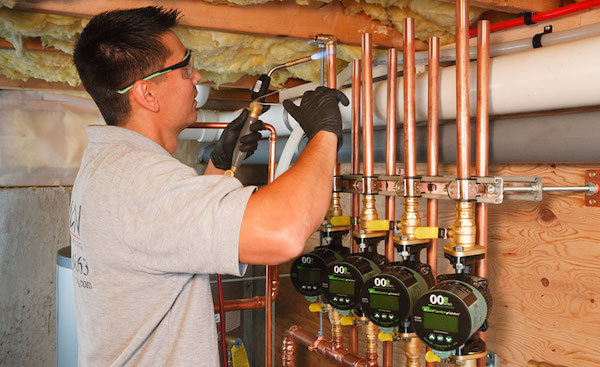Although residential construction projects often focus on major living spaces such as the kitchen, other rooms — for example, the bathroom — are growing in prominence. People want to save money on their water consumption, and they do not want the change to result in poor water pressure. Instead, they are increasingly willing to pay Read more
Smart Technology

Although residential construction projects often focus on major living spaces such as the kitchen, other rooms — for example, the bathroom — are growing in prominence. People want to save money on their water consumption, and they do not want the change to result in poor water pressure. Instead, they are increasingly willing to pay for the technology that allows them to enjoy greater comfort while minimizing the consequences of leaks and other plumbing problems. These popular bathroom design trends reflect the effects that plumbing innovations have had in the industry.

Smart Technology
The integration of smart technology has made plumbing a great way for homeowners to improve efficiency without compromising practical use. Modern plumbing systems rely on smart systems to track water usage and use sensors to identify leaks before they cause significant water damage. Smart technology and AI can integrate into every aspect of the plumbing system, from smart watering features in the backyard to smart toilets that can be flushed using a mobile device. With this technology, plumbers gain more information about the condition and function of the plumbing system, making problems easier to find and address.
Efficient Fixtures
Water-saving fixtures have become a standard in homes, with features that homeowners have come to expect. Low-flow showerheads and toilets have been available for decades, but the function of these fixtures has dramatically improved. Modern designs use a fraction of the water of older models, but they provide similar levels of water pressure. When combined with smart technology such as sensors, residents can avoid using water when they do not need it. Tankless or heat-pump water heaters round out the package, allowing homeowners to minimize energy consumption for water heating.

Water-Saving Plumbing
The conversation about water-saving features continues, expanding into the entire plumbing system. Homeowners pay for their water consumption, when much of the water they use ends up going back to the municipal water system almost immediately. The latest systems allow homeowners to maximize their use by conserving certain types of greywater. Plumbers can install a system that cycles water from certain drains to other parts of the home, for irrigation or other uses. Property owners can see their water consumption decrease, while growing their home’s overall sustainability.
Data Analytics
People no longer have to wonder about their water consumption or the function of their plumbing systems because data can readily provide that information. Many homeowners can now spot a leak using sensors that alert them to a sudden change in water consumption. This information can save thousands of dollars in expensive repairs, while minimizing stress on the local water supply. Plumbers can use AI to find patterns based on existing data to predict the likelihood of a leak and help guide homeowners in the best time to upgrade their plumbing.

Chic Designs
Plumbing innovations are transforming the bathroom from a limited space to a true retreat. The separation of bathtub and shower has revolutionized the style and function of the bathroom. The bathtub becomes a place for rest and relaxation, featuring designs that become the statement piece of the bathroom. Without a bathtub, shower spaces can expand to meet the needs of the residents. The latest designs feature full-body showers, steam showers, soundproof ceiling installation in North Aurora, IL, and the technology homeowners need to control all of it with voice-activation or the touch of a button.
Homeowners may think more about their plumbing in recent years, which highlights the changes to the plumbing industry. Modern plumbing innovations allow homeowners to reduce their water consumption and maintain a closer watch on the condition of their plumbing. While these advances improve efficiency, they also give residents a comfortable, relaxing space while they rest from the cares of the day.
Brothers Dave and Jeff Dunaway are the Founders of Dunaway Brothers, which specializes in carpentry and decorating for commercial building projects throughout Chicagoland. Dunaway Brothers was founded in 2006 and also owns Sandwich Millworks, its residential branch, in Sugar Grove, IL. Sandwich Millworks specializes in custom millworks and is a Marvin certified window and door dealer.

The leading provider of technician-first software for contractors announces the promotion of Enterprise Account Executive Austin Piazza and Account Executive Lindsey Fisher XOi, the leading provider of technician-first smart technology for commercial and residential field service companies, announces two new sales promotions as the company continues to build opportunities and provide support for contractors and Read more
The leading provider of technician-first software for contractors announces the promotion of Enterprise Account Executive Austin Piazza and Account Executive Lindsey Fisher
XOi, the leading provider of technician-first smart technology for commercial and residential field service companies, announces two new sales promotions as the company continues to build opportunities and provide support for contractors and field service business owners.
In their new roles, Enterprise Account Executive Austin Piazza and Account Executive Lindsey Fisher are responsible for developing and enhancing relationships and educating the industry about XOi’s unique capacity to help contractors solve the skilled trades gap and grow their business.

XOi, the leading provider of technician-first field service technology, has promoted Enterprise Account Executive Austin Piazza (left) and Account Executive Lindsey Fisher (right) to develop and enhance customer relationships and educate the industry about XOi’s unique capacity to help contractors solve the skilled trades gap and grow their business.
“At XOi, we’re shaping the future of field service,” said Aaron Salow, founder and CEO of XOi. “Our sales team is essential to our mission. They connect our technology with the contractors and technicians who are using it to transform the industry. Austin and Lindsey have proven their commitment and expertise, and we’re looking forward to seeing them continue to excel and drive results for XOi and our customers.”
Piazza, a University of Alabama graduate, joined XOi in 2019. He has more than a decade of management, technology and business development experience. As an enterprise-level account executive, Piazza is focused on connecting large businesses with XOi’s solutions.
“I’m passionate about helping clients discover the right software solutions for their specific needs,” Piazza said. “XOi has established itself as the right tool to empower technicians in the field so they can operate more efficiently and increase revenue.”
Fisher, who also graduated from the University of Alabama, joined XOi in 2020. She has extensive sales experience in SaaS and technology.
“I’m excited to take this next step with XOi,” Fisher said. “I truly believe XOi can deliver meaningful, measurable results for contractors by addressing the skilled trades labor shortage and making their companies more efficient.”
XOi users report, on average, a 20% reduction in the amount of time it takes to complete tasks, an additional $1.4 million in new replacement and preventive maintenance contract revenue, and a 40% reduction in second truck rolls.
For more information about XOi, visit https://xoi.io.

It doesn’t seem so long ago we were fending off the “green” movement that was being force-fed into the vocab of working contractors. From green building to green technology, greenwashing was so prevalent that really the only “green” contractors were concerned with was the one they were chasing every day—a profit. But alas, a new Read more
It doesn’t seem so long ago we were fending off the “green” movement that was being force-fed into the vocab of working contractors. From green building to green technology, greenwashing was so prevalent that really the only “green” contractors were concerned with was the one they were chasing every day—a profit.
But alas, a new word has dominated the marketing lexicon—“smart.” Smart cars, smart phones, smart homes and yes, even smart pumps. “The problem is they’re not that smart,” says John Barba, contractor training manager, Taco Comfort Systems. “I’ve heard people who you’d think would know better say idiotic stuff like ‘these pumps do the thinking for you,’ and ‘they take the thinking out of it,’” says Barba.

Image Credit: Noven; Bethesda.net
How about giving credit to the users who actually interact with such devices? “The thing that separates the professional from the DIY’er or the handyman is his or her ability to think and their understanding of systems. That’s why people hire professionals, and that’s why our profession is so valuable. When it comes to systems and components, the professional is the smart one,” says Barba
“The professional knows what he’s holding in his hands, why he’s using it and what impact it’s going to have on the overall system performance. There’s not a pump made that can replace what the pro knows. The machines haven’t taken over yet,” continues Barba.
Intelligent Systems
If the integration or connectivity of disparate components to a holistic, communicative system is considered smart, then I’m buying in. Why not just say that in the first place? Because it’s not market-y, and it’s too long for a tagline. Okay, then the evolution of homebuilding can be categorized as being smart or intelligent because the integration of, say, lighting, security, home entertainment, etc., can be accessed from the convenience of your smart phone (more on that later). But I’d say that is more a matter or convenience than smarts.
In fact, as part of these communicative devices, perhaps on a broader, commercial stage, we are witnessing new phrases popping up such as the Internet of Things (IoT). According to Sokwoo Rhee, former associate director of the Cyber-Physical Systems Program at the National Institute of Standards and Technology (NIST) from 2014 to 2021, IoT can be described as the advancements in sensors and communication technologies that enable us to collect data which was not previously practical; the explosive increase of the amount of collected data enabled us to perform analytics which was not previously practical or meaningful; and the advancements in data analytics that will enable us to better control and optimize the systems to benefit our daily life. Again, I can buy into that.
Remember when cell phones were labeled smart phones? I think they still are. It’s 2007 and my fancy handheld device can make calls and perform functions as a computer. Well guess what? Today, they are just considered phones. And, if they don’t perform almost any function you can think of, well, then perhaps they are just dumb.
And, oh yeah, what makes a smart car? Good gas mileage? Actually, the term Smart Car came from a venture between watchmaker Swatch and Mercedes-Benz, with Smart standing for Swatch Mercedes Art, a branding stroke of genius. Its small stature was designed for city driving with big gas savings and easy maneuverability, with not-so-good safety ratings, I’d imagine. Debuting in the U.S. in 2008, last I read, it was discontinued in 2019.
And back to those smart, magical pumps? “The only word I hate more than ‘smart’ is ‘magic,’” says Barba. “Anyone who says something like that really doesn’t know how ECM circulators really work, or how they interact with systems. No matter how ‘smart’ people claim these things are, you can’t get away from the fundamentals of circulators. These things have performance—or ‘control’ curves—and the system still has a system curve,” says Barba.

According to Barba, there’s no such thing as magic, and the only circulator that can even come remotely close to sizing itself is the Taco VT2218—it’s a Delta-T circulator and varies its speed to maintain a fixed delta-T in the system.
“And I don’t care how many lights and buttons you put on the circulator, you can’t change the fact that when you have a fixed performance curve—as every Delta-P variable speed circulator has—the system has to work where the system curve intersects the control curve. If it’s a zone valve system, speed and flow will change as zone valves open and close, but it still works on the selected control curve. If it’s a zone pump system, a Delta-P circulator won’t vary its speed because there’s nothing in a zone that would create a change in pressure differential. It goes one speed and that’s it. That’s not what I’d call smart.
“Now, that doesn’t mean you shouldn’t use a Delta-P pump as a zone pump. You should—it’ll do some pretty cool things for you provided it’s set up properly. And for that, you need a smart installer who understands what these circulators do, what they don’t do and how they interact with the system,” says Barba.
“Just because a circulator is variable speed, that doesn’t make it magic. This isn’t Hogwarts and you’re not Harry-freaking-Potter.”
What’s my point in all of this? Dig deeper, educate yourself, rely on your experience and knowledge, and don’t rely on marketing taglines such as Smart or Green to sell you completely on something.

As plumbers, we tend to think of our industry as being somehow separate from mainstream technology. But the truth is that water transit technology is getting better all the time. Yes – the changes are a little slower than in the electronics world. But they are occurring. And they’re bringing big benefits. Plumbing technology is: Read more
As plumbers, we tend to think of our industry as being somehow separate from mainstream technology. But the truth is that water transit technology is getting better all the time.
Yes – the changes are a little slower than in the electronics world. But they are occurring. And they’re bringing big benefits.
Plumbing technology is:
- Making homes more efficient
- Reducing the number of leaks
- Improving the purity of water
- Making problems easier to fix and diagnoses
- Making installations less time-consuming
- Reducing water usage
- Making tanks redundant
- Allowing for touchless faucets and toilets
In this post, we take a look at some of the most talked-about plumbing technology to hit the market in recent years and the effect it is having on people’s lives.
Let’s get started.
Smart Irrigation
Google searches for the term “smart irrigation” are exploding at the moment. And it’s not hard to understand why. People don’t want to have to manage their gardens or crops’ hydration levels manually. Instead, they want to put the system on autopilot so that they can avoid drudgery.
The way smart irrigation works is pretty simple. You start by running a bunch of sprinklers or water dispensers next to the plants you want to water and then hook the system up to the mains. You then connect the sprinkler control to an app that uses sensor data to figure out when it should be watering. It’s clever enough to know that it doesn’t need to water when it rains, but does during a drought.
Smart irrigation also allows customers to see precisely how much water they’re using for environmental reasons – currently a major concern.
Leak Detectors
Imagine if you were able to attach detectors to galvanized steel pipes that would automatically tell you if there was a leak. Homes and businesses would save billions every year.
Well, as many of you will know, this technology already exists. All you need to do is install a simple-looking detector on a pipe and then it will tell you whether there’s a leak or not.
Many smart home brands, such as Samsung and Nest, already have leak detectors in their product lineup. Given the potential environmental benefits, we are probably going to see these installed as standard in the near future.
Touchless Technology
Traditional mechanical plumbing systems required people to physically turn handles and push knobs. But given the coronavirus, and germs in general, that old arrangement is not ideal, especially in public bathrooms.
Touchless technology, however, provides a way around this predicament. It works using a motion sensor. People place their hands in front of it and it changes the light signal, tripping a circuit which then mechanically activates the device. For toilets, users simply place their hands close to a sensor, and the thing flushes.
For plumbers, these new setups complicate matters somewhat. You need to understand both plumbing and electronics to service this equipment. But, as of right now, the writing’s on the wall. This is where the industry is heading.
Greywater Recycling Systems
Greywater recycling systems are another eco-friendly innovation people want to learn more about. Homes and businesses want to be able to recycle water from dirty dishes and use it for other purposes, such as irrigation.
Brands offering greywater systems are coming online all the time. But there’s an information problem: currently, the vast bulk of regular consumers don’t even know these systems exist.
That will likely change in the coming years. Consumers want to save water. And greywater recycling systems aren’t particularly complicated. They let people save on their overall water bill while also potentially providing their plants with additional nourishment.
Smart Showers
Traditional showers involved a lot of careful calibration to get the temperature just right. Users often had to adjust dials by minuscule amounts, otherwise, it would be too hot or too cold. Repeating their experience in other places, such as hotels, was impossible.
Smart showers hope to put an end to this. Instead of presenting the user with a dial, these feature a touchscreen control panel that allows direct temperature selection. So if somebody knows that they enjoy showers at 42 C, then they can simply choose this temperature and start washing.
Smart showers are still a luxury item, but that won’t last. Just like prices for other electronics, the cost of these systems is coming down all the time. And the market is growing too. So many people want to purchase them.
Tankless Water Heaters
Tankless water heaters are currently a bit of an obsession among the home-owning community. Everybody seems to be interested in them right now.
Tankless water heaters are popular because they offer space-saving. Without a tank, you can potentially fit more living space into a given footprint.
Consumers also love tankless water heaters because they provide a continual stream of hot water. So long as the element is active, a warm shower never needs to come to an end.
The primary driving force behind this trend appears to be convenience. People don’t want to spend money on maintaining clunky tanks. They want something simple and durable.
They also want energy-efficient solutions. Homeowners feel uncomfortable about keeping water hot all the time. They’d prefer to simply heat it when they need it.
Linked to tankless water heaters is the technology of hot water circulation. The idea here is to eliminate the problem of cold water sitting in pipes. Usually, you would first have to run a shower or faucet to eliminate the cold water before the hot water came through.
But with hot water circulation, you simply apply low heat to the small amount of water in the pipes and use a pump to circulate it around. Then, when the time comes to use it, hot water comes out immediately.
So, in summary, the world of plumbing is not standing still. Technology is advancing all the time, and it’s making people’s lives better. What’s interesting is how much of this technology saves water and makes systems more reliable. Homes and businesses could very well face much lower prices in the future.
